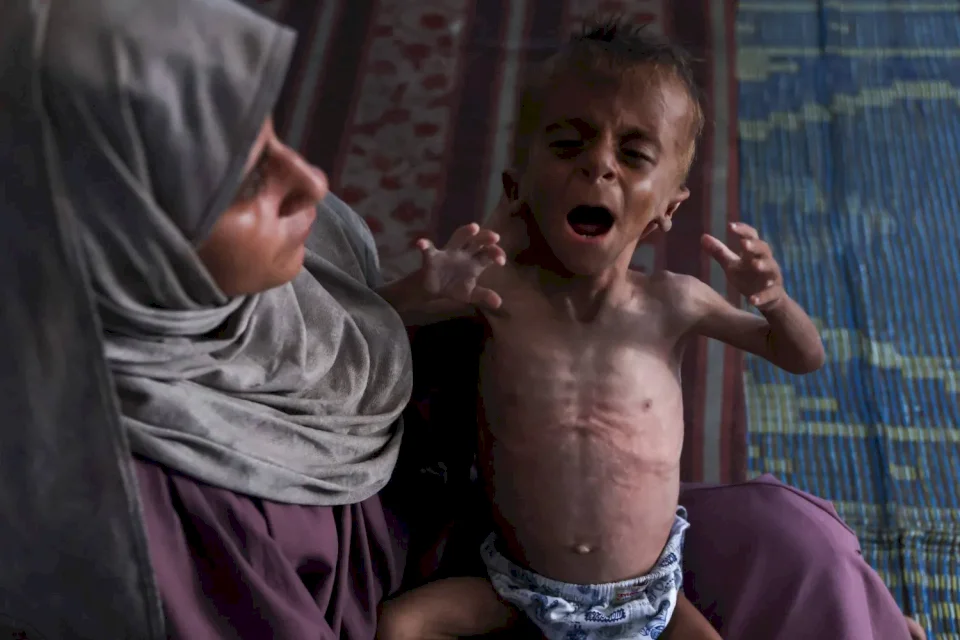
Gaza is Starving... Here's What Food Shortage Does to the Human Body
SadaNews - Amid a near-total Israeli blockade, over two million people in the Gaza Strip - including about one million children - are facing a worsening and desperate famine. According to the United Nations, about one in three people in Gaza goes several days without any food. The few hospitals still operating in the territory are reporting an increase in deaths from malnutrition and famine. Images and videos coming from Gaza show extremely thin children, their skin stretched over their bones and their bellies swollen from hunger.
For months, humanitarian organizations have warned of an imminent danger of famine, as Israel tightens restrictions on the entry of UN supplies into Gaza. More than 100 humanitarian organizations issued a joint statement on Wednesday describing the situation as "mass famine." According to the Ministry of Health in Gaza, which is affiliated with Hamas, more than 100 people have died from hunger since the beginning of the war, with new deaths recorded daily, according to a report by the American newspaper "Washington Post."
With the spread of hunger, the devastating effects on the human body become apparent. The younger a person is, the quicker and deeper the damage, according to the "Washington Post."
The body relies on carbohydrates to convert them into glucose, which is processed in the liver and distributed throughout the body, especially to the brain.
Once glucose stores are depleted, the body begins to rely on fats as a source of energy.
However, when the body does not receive adequate food, it starts to break down protein from muscles for energy; ultimately leading to the body's inability to supply essential nutrients to vital organs and tissues. This happens in children at a faster rate, due to their limited stores and high energy needs for growth.
As a result, muscles begin to shrink, organs fail to function normally; the body can no longer regulate its temperature, and the skin becomes pale, potentially bleeding from the gums. The immune system loses its ability to heal wounds and fight infections, such as diarrhea; leading to a vicious cycle that exacerbates nutrient deficiency.
The digestive system is one of the first systems to shut down, leading to decreased acid production in the stomach, chronic inflammation, stomach shrinkage, and loss of appetite. If food becomes available later, it must be introduced slowly and under medical supervision in hospitals.
The heart shrinks, resulting in reduced blood flow, slowed heart rates, and lowered blood pressure. Eventually, the heart may cease to function.
Breathing slows down, and lung capacity weakens, which may eventually lead to respiratory failure.
With the brain deprived of energy and essential nutrients, signs of indifference, fatigue, and agitation emerge. Children require more energy than adults for their brain development; making them more susceptible to the effects of food shortages and hindering their ability to learn in the future.
Lifetime Health Problems
Doctors and nutritionists say that children who survive hunger, bombardment, infectious diseases, and psychological trauma are often condemned to face lifelong health problems. Famine disrupts the full development of their brains and bodies, and many of them will be shorter and weaker.
Even infants who survive are exposed to severe risks due to malnutrition.
Micronutrients (vitamins and minerals) are essential for growth. For instance, in the absence of sufficient amounts of vitamin "A" - found in eggs, fish, and vegetables - children in Gaza are at risk of vision deterioration.
A lack of zinc makes it difficult for children to gain weight.
Low iron, more easily found in meats, leads to decreased energy and weakened concentration.
Children who do not receive essential vitamins and minerals have weakened immune systems, making them more susceptible to infections such as diarrhea, pneumonia, and fever.
Malnutrition can also hinder long-term physical growth.
On Friday, Israel indicated that it would allow foreign countries to drop aid from the air to the Gaza Strip, according to Israeli army radio. However, this type of aid is not at all sufficient for the residents of Gaza: Every plane carries only a quantity less than a single truckload coming in from the ground, and these air drops pose a risk to people on the ground, according to the "Washington Post."

High-level sources reveal to SadaNews: Washington seeks to hold a Gaza Reconstruction Conf...

Sources for SadaNews: Arrangements for a visit by a technocrat committee delegation to Gaz...

Permanent Intelligence Presence: Washington's Plan for Venezuela After Maduro

Reports: Investigations Revealed in a Security Case Related to Smuggling Goods from Israel...

Revealing that Settler Forced Two Italian Officers to Kneel Under Threat of Weapon in Rama...

Hebron.. The Empire of the Palestinian Economy that Horrifies Israel

The Jordanian and Israeli flags fly over the Baquoura Bridge on the border

